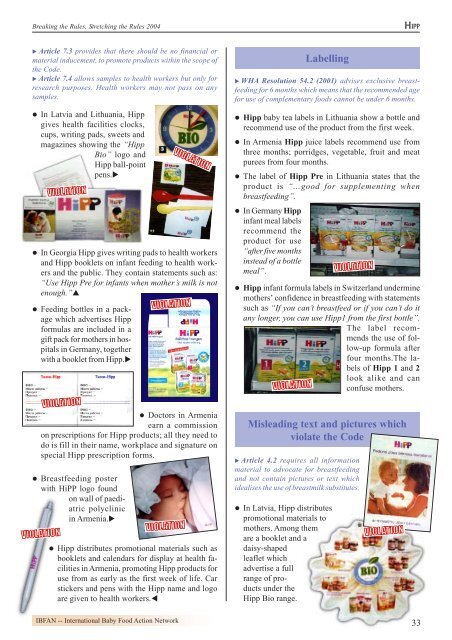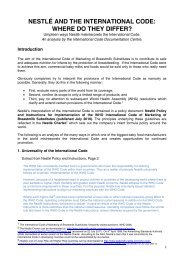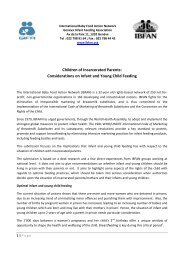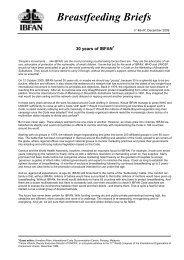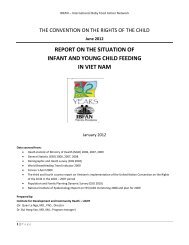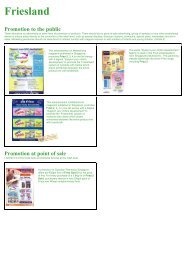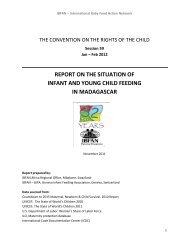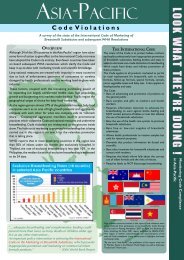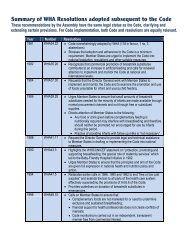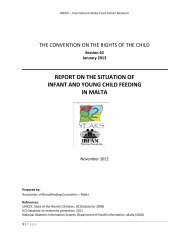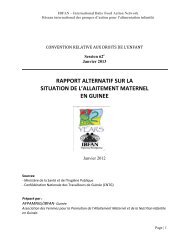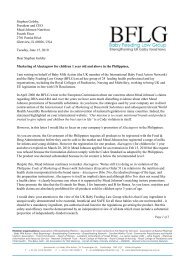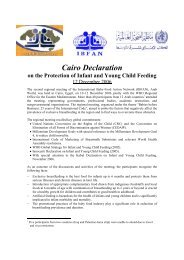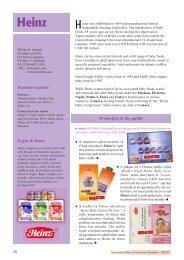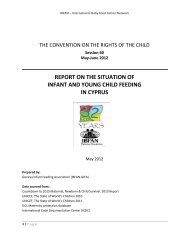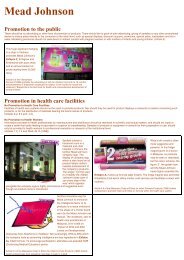You also want an ePaper? Increase the reach of your titles
YUMPU automatically turns print PDFs into web optimized ePapers that Google loves.
Breaking the Rules, Stretching the Rules 2004 HIPP<br />
� Article 7.3 provides that there should be no financial or<br />
material inducement, to promote products within the scope of<br />
the Code.<br />
� Article 7.4 allows samples to health workers but only for<br />
research purposes. Health workers may not pass on any<br />
samples.<br />
� In Latvia and Lithuania, Hipp<br />
gives health facilities clocks,<br />
cups, writing pads, sweets and<br />
magazines showing the “Hipp<br />
Bio” logo and<br />
Hipp ball-point<br />
pens.�<br />
� In Georgia Hipp gives writing pads to health workers<br />
and Hipp booklets on infant feeding to health workers<br />
and the public. They contain statements such as:<br />
“Use Hipp Pre for infants when mother’s milk is not<br />
enough.”�<br />
� Feeding bottles in a package<br />
which advertises Hipp<br />
formulas are included in a<br />
gift pack for mothers in hospitals<br />
in Germany, together<br />
with a booklet from Hipp.�<br />
� Doctors in Armenia<br />
earn a commission<br />
on prescriptions for Hipp products; all they need to<br />
do is fill in their name, workplace and signature on<br />
special Hipp prescription forms.<br />
� Breastfeeding poster<br />
with HiPP logo found<br />
on wall of paediatric<br />
polyclinic<br />
in Armenia.�<br />
� Hipp distributes promotional materials such as<br />
booklets and calendars for display at health facilities<br />
in Armenia, promoting Hipp products for<br />
use from as early as the first week of life. Car<br />
stickers and pens with the Hipp name and logo<br />
are given to health workers.�<br />
<strong>IBFAN</strong> -- International Baby Food Action Network<br />
Labelling<br />
� WHA Resolution 54.2 (2001) advises exclusive breastfeeding<br />
for 6 months which means that the recommended age<br />
for use of complementary foods cannot be under 6 months.<br />
� Hipp baby tea labels in Lithuania show a bottle and<br />
recommend use of the product from the first week.<br />
� In Armenia Hipp juice labels recommend use from<br />
three months; porridges, vegetable, fruit and meat<br />
purees from four months.<br />
� The label of Hipp Pre in Lithuania states that the<br />
product is “…good for supplementing when<br />
breastfeeding”.<br />
� In Germany Hipp<br />
infant meal labels<br />
recommend the<br />
product for use<br />
“after five months<br />
instead of a bottle<br />
meal”.<br />
� Hipp infant formula labels in Switzerland undermine<br />
mothers’ confidence in breastfeeding with statements<br />
such as “If you can’t breastfeed or if you can’t do it<br />
any longer, you can use Hipp1 from the first bottle”.<br />
The label recommends<br />
the use of follow-up<br />
formula after<br />
four months.The labels<br />
of Hipp 1 and 2<br />
look alike and can<br />
confuse mothers.<br />
Misleading text and pictures which<br />
violate the Code<br />
� Article 4.2 requires all information<br />
material to advocate for breastfeeding<br />
and not contain pictures or text which<br />
idealises the use of breastmilk substitutes.<br />
� In Latvia, Hipp distributes<br />
promotional materials to<br />
mothers. Among them<br />
are a booklet and a<br />
daisy-shaped<br />
leaflet which<br />
advertise a full<br />
range of products<br />
under the<br />
Hipp Bio range.<br />
33 33


